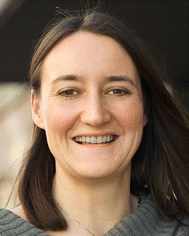 Open Access Article
Open Access ArticleCreative Commons Attribution 3.0 Unported Licence
New Editor-in-Chief and Deputy Editor-in-Chief for MSDE: reflections and vision
Claire S.
Adjiman
 *a and
Andrew L.
Ferguson
*a and
Andrew L.
Ferguson
 *b
*b
aDepartment of Chemical Engineering, Sargent Centre for Process Systems Engineering and Institute for Molecular Science and Engineering, Imperial College London, London, UK. E-mail: c.adjiman@imperial.ac.uk
bPrtizker School of Molecular Engineering, University of Chicago, Chicago, USA. E-mail: andrewferguson@uchicago.edu
MSDE was launched with a broad vision to attract and publish work “following the journey from molecular-level design and optimisation through systems level functionality to real-world applications” and employ “a problem solving strategy or vision based on molecular-level design or optimisation (be it through theory, modelling or experiment) leading to desired systems-level functionality and performance”. Under the leadership of Juan de Pablo, MSDE has pursued this vision to become a flagship multidisciplinary journal for the dissemination of novel methods for the design of a broad range of molecules, materials, and molecular systems, and of their application to the discovery and engineering of new chemical, biochemical, and physicochemical systems.
Today, the MSDE proposition – standing at the crossroads between pressing societal needs and emerging scientific innovation – is ever more timely. MSDE authors employ experimental, theoretical and computational approaches to establish new understanding of molecular properties and behaviours, and use this understanding to design and assemble better materials, systems, and processes to achieve specific functions. There is no doubt that new paradigms for molecular and materials design and engineering are urgently needed to make human activity more effective and sustainable. Although this presents a considerable challenge, we are witnessing the convergence of scientific advances that can be brought to bear on the design of multiscale systems spanning from atoms and molecules to products, devices, and manufacturing processes. These trends are being driven by unprecedented new capabilities to characterise molecules and materials at the nanoscale, conduct high throughput screening, deploy ever more accurate and sophisticated physics-based and data-driven models, train new machine learning models to understand and engineer molecules and materials, and integrate artificial intelligence and automated robotics within “self-driving laboratories”. These powerful tools have enabled the community to make new headway in grand challenges in science and engineering, many of which are closely aligned with UN Sustainable Development Goals. By way of example, in the last few years, MSDE readers have been able to discover work employing state-of-the-art techniques to contribute to UNSDG challenges such as clean water and sanitation (https://doi.org/10.1039/D2ME00284A), affordable and clean energy (https://doi.org/10.1039/C9ME00166B), climate action (https://doi.org/10.1039/D2ME00130F) and human health and well-being (https://doi.org/10.1039/D3ME00059A).
It is our ambition for MSDE to provide a forum to disseminate scientific advances that will translate into solutions to societal challenges, and to enable such advances by supporting a burgeoning multi-disciplinary community of researchers. The combination, within MSDE, of articles focused on new methods with those focused on specific applications provides an ideal opportunity to identify cross-pollination between these two distinct, but mutually reinforcing, thrusts: progress in important molecular and materials applications is enabled by new theoretical, experimental, computational, and/or artificial intelligence tools, and pressing challenges can inspire new cross-disciplinary method development. This ethos is exemplified in, for example, the integration of azo-dye technology and additive manufacturing to print light-responsive shape memory polymers (https://doi.org/10.1039/D2ME00201A), the rational design of ionic liquids to remove heavy metal contaminants from fuels (https://doi.org/10.1039/C7ME00111H), and the tuning of synthetic polymer gels as reliable model systems for brain tissue, to understand and prevent injury (https://doi.org/10.1039/C6ME00051G). MSDE has sought to promote and foster such collaborations through its scope and ethos (https://www.rsc.org/journals-books-databases/about-journals/msde/), themed collections centred on both pressing challenges and methodological frontiers (https://pubs.rsc.org/en/journals/journalissues/me#!themedcollections), and the Frontiers in Molecular Engineering symposium series that provides a biannual forum for the community to exchange new findings, perspectives, and ideas (https://www.rsc.org/events/detail/76058/msde-symposium-2023-frontiers-in-molecular-engineering).
The ability to bring together researchers from often disconnected areas to strengthen the emerging molecular/material design community is central to the MSDE vision and we need to reach far and wide across fields of research to achieve this. In the next few months, we will be taking steps to enhance our ability to do this with the appointment of new Associate Editors to the Editorial Board, additional themed issues, continued support for emerging investigators, and a commitment to a diverse and inclusive culture within scholarly publishing (https://www.rsc.org/policy-evidence-campaigns/inclusion-diversity/joint-commitment-for-action-inclusion-and-diversity-in-publishing/). We will also strive to elevate the profile of the journal among industrial researchers and on the international stage. We will of course continue to focus on publication excellence and on offering a positive publishing experience through fast decisions, smooth post-acceptance processes and the promotion of the work of MSDE authors across multiple platforms.
The success of MSDE is predicated on the continuing engagement of its authors, readers and reviewers, and service to the scholarly community. MSDE aims to serve as a trustworthy and reliable home for cutting edge research in interdisciplinary molecular and materials engineering. We invite you to send us your best work, share your favourite MSDE articles widely, and communicate your views and ideas with us via email and our periodic author and reader surveys. It is our honour to build upon the achievements of the journal over the first seven years of its life and to work with the editorial staff and the scientific community to steward it towards future success.
| This journal is © The Royal Society of Chemistry 2023 |


